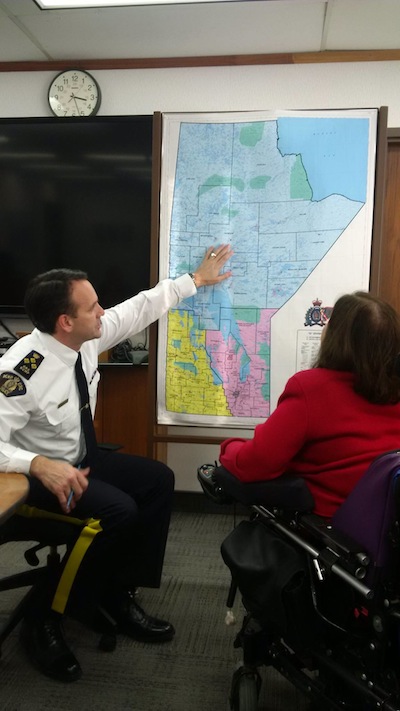At a Winnipeg Jets game, Judith Heumann, U.S. special advisor on international disability rights, speaks to hockey fans and draws the winning 50/50 ticket. (photo from Judith Heumann)
The journey of Judith Heumann, U.S. special advisor on international disability rights, is featured in the Canadian Museum of Human Rights’ (CMHR) exhibit Turning Points of Humanity. On Human Rights Day, Dec. 10, Heumann visited CMHR, which is located in Winnipeg, and gave a talk on the disability rights movement.
Heumann is an internationally recognized leader in the disability community and a lifelong civil rights advocate. For more than 30 years, she has worked with various organizations and governments to advance the human rights of people with disabilities.
A daughter of Holocaust survivors and the oldest sibling of three who grew up in Brooklyn, Heumann had polio in 1949, when she was 18 months old. She has used a wheelchair ever since.
“My parents were Jewish German immigrants who came over when they were teens from Germany,” Heumann told the Independent. “During the war, my parents lost both of their parents and other relatives. Being Jewish was a big part of our family life, and also addressing issues around the Holocaust was important.
“My parents didn’t speak that much directly about their experiences. I did find out later that they were doing classes at a junior high, talking about their experiences living in Germany in the ’30s.”
Heumann’s first experience with discrimination due to her disability happened when she was 5 years old. Her mother took her to school and the school principal denied her admission because she used a wheelchair. The city sent a teacher to her house for home schooling for a total of 2.5 hours per week up until halfway through Grade 4.
“In that time period, my parents were looking for opportunities for me to be able to get into school,” she said. “I finally was able to get into school when I was in the middle of the fourth grade, but it was just segregated classes for disabled kids.
“My mother learned to become an advocate over the years. Not just for me, but working with other parents, and she and my dad were very important role models for me.”
It was Heumann’s parents’ advocacy that spurred her onto her own path of advocacy work in different communities in the United States, to start, and then in countries around the world.

At CMHR, Heumann spoke to about 200 people about the types of human rights violations disabled people experience and the need for good and enforced laws. She encouraged Canada to look at having laws similar to the United States’ Disabilities Act.
“This is so that there could be more uniformity in the country as far as construction and non-discrimination,” Heumann explained.
She added, “I know the Trudeau administration is looking at this as a possibility and I think Manitoba and [British Columbia] are also looking at this as provinces.
“I think Canada is doing good work in the area of disability,” she said. “I know people are very hopeful that the Trudeau administration will allow Canada to be more of a player internationally than they have been in the past number of years in the area of disability.”
Heumann has had her share of experiences with the lack of construction standardization in Canada, recalling a time when she was visiting a Holiday Inn on one of her business trips. Heumann’s staff confirmed her reservation and made sure to request a roll-in shower. When she checked in, she made sure the roll-in shower request was noted on paper, yet, when she got to the room, there was no roll-in shower.
“I thought they’d mistakenly put me in the wrong room,” said Heumann. “When I called the front desk, they informed me that they didn’t have any roll-in showers. I was told that although I requested it, they don’t have one. I asked when they were planning on telling me that they don’t have one, then I called the 1-800 Holiday Inn number to express my deep concern, because Holiday Inns in the United States are accessible. It’s one of the hotels that you can make a reservation at and ask for what you need, and they will tell you if they have it or not. The woman on the phone said, ‘Oh no. That’s not possible that you couldn’t get a roll-in shower at a Holiday Inn.’ She asked where I was and I told her Canada, and she said, ‘Oh, Canada.’
“It’s not at all to say that we don’t have all kinds of problems in the United States, too, but the problem in Canada is you don’t have uniformity in your new construction or modifications.”
A similar situation happened at the hotel in which Heumann was staying in Winnipeg. The room was great, except that it had an adjoining room with a door between the two that was too narrow for her wheelchair. Heumann could not get from one room to the other without having to exit and enter through the front doors. She used this as an example during her talk at CMHR.
Also during her stay in Winnipeg, Heumann went to her first hockey game. “I really felt the spirit of people in Manitoba when I gave a very brief response to a question asked by the commentator right before I pulled the ticket for the 50/50,” said Heumann. “He asked me about the State Department and what we were doing in the area of disability. I thought, nobody is going to listen, but when I left and we were going back to the hotel at the end of the game, it was clear people were listening. Some people came over and said they liked what I’d said. I didn’t care if they liked what I said, but I was impressed that they actually listened and took the time to say something. Manitoba was a great experience.”
Rebeca Kuropatwa is a Winnipeg freelance writer.

